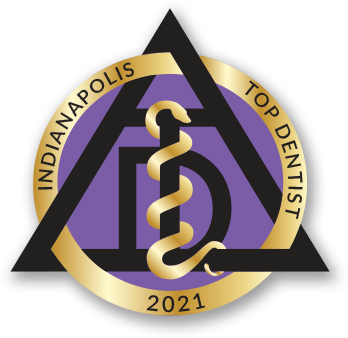Dental Crowns – Indianapolis, IN
Flawlessly Repair Damaged Teeth
 If you’re dealing with discomfort or even embarrassment as a result of damaged teeth, then you deserve to have a fully functional smile again. Dr. Farthing and Dr. Tepner at Indianapolis Family Dentistry can make your teeth look and feel their best once more with high-quality, customized dental crowns. If you’re ready to revitalize your smile, then contact us to learn more about how dental crowns in Indianapolis could benefit you!
If you’re dealing with discomfort or even embarrassment as a result of damaged teeth, then you deserve to have a fully functional smile again. Dr. Farthing and Dr. Tepner at Indianapolis Family Dentistry can make your teeth look and feel their best once more with high-quality, customized dental crowns. If you’re ready to revitalize your smile, then contact us to learn more about how dental crowns in Indianapolis could benefit you!
What Is a Dental Crown?
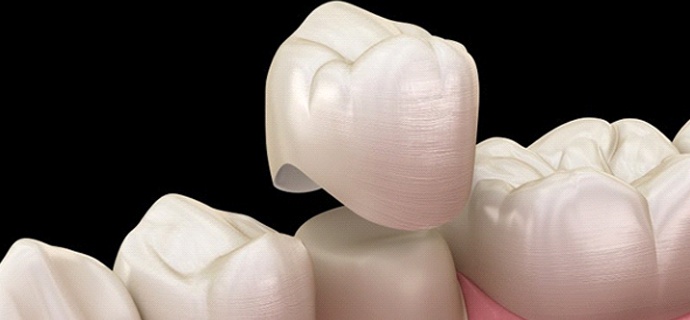
A dental crown is a tooth-shaped restoration that is designed to fit snugly and comfortably over a tooth, effectively “capping” it off and protecting it from further harm. In addition to shielding a structurally compromised tooth, dental crowns can serve many purposes, including:
- Repairing a significantly decayed tooth that cannot be successfully treated with just a filling.
- Holding a cracked or fractured tooth together.
- Protecting a weakened tooth after a root canal procedure.
- Restoring a single dental implant.
- Supporting a dental bridge.
- Covering a tooth that has cosmetic concerns.
Dental crowns can be crafted from several different kinds of materials, but our team will always use tooth-colored porcelain when possible so that patients can maintain a smile that looks healthy and natural.
The Dental Crown Process
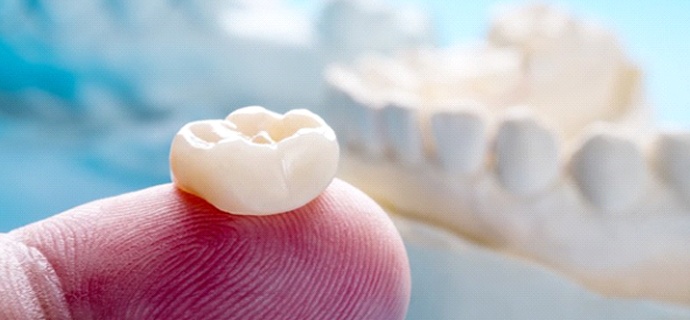
In most cases, your dentist in Indianapolis can complete the dental crown process in only two appointments. During the first one, we’ll carefully prepare your tooth and take detailed impressions in order to ensure your new restoration is as precise and personalized as possible. A temporary crown will also be placed so that your tooth is protected while the dental lab begins crafting your actual crown. Once we receive the finished product, we’ll invite you back to our dental office so that we can securely place your new, permanent crown and confirm that you’re happy with the final result.
The Benefits of Getting a Dental Crown

Dental crowns can provide you with a number of benefits, such as:
- Flawless appearance – Each dental crown is 100% personalized to complement your facial features and seamlessly blend in with the rest of your smile.
- Greater comfort – By protecting your tooth, you’ll be able to chew your favorite foods without discomfort or pain.
- Preservation of your tooth – A crown prevents a tooth from sustaining further damage. In some cases, the tooth may even be spared from needing an extraction.
- Simple maintenance – Your crown can last for a decade or even longer with very little oral care beyond regular brushing, flossing, and dental checkups.
- Insurance coverage – Crowns are often covered at up to 50% by dental insurance providers after you’ve met your deductible but before you’ve exceeded your annual maximum.
Understanding the Cost of Dental Crowns
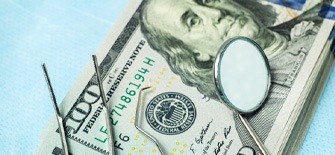
If you need a dental crown, your financial situation should never stand in the way of getting the high-quality restoration you need. The cost of dental crowns isn’t as much as you’d expect. Indianapolis Family Dentistry strives to keep dental care within everyone's budget. There's no flat fee for crowns because many factors affect the amount you will pay. Your dentist will create the durable crown you need without spending your life savings.
Factors That Affect the Cost of Dental Crowns
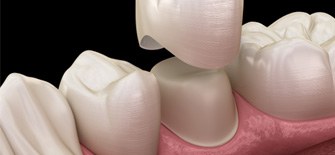
No two mouths or situations are identical, so there's no set price for a dental crown. Many things will be included in your estimate, which may include:
- Consultation: You'll require an initial consultation with your dentist to examine your tooth and design a personalized treatment plan. Besides a visual examination, they may need diagnostic images, like X-rays. After examining your mouth, your dentist may determine you need additional procedures.
- Additional Procedures: Crowns are versatile and can be used along with other procedures, like root canal therapy or a bridge. Restorative procedures are often partially covered by dental insurance.
- Materials: Don't focus on the price when choosing a material for your crown because discounted options can have shorter life expectancies. Instead, focus on quality to ensure your investment lasts for many years. We will help you choose the best material for your needs and budget to enjoy long-lasting results that look natural.
- Location: The tooth being treated can also influence the cost, like molars.
Rest assured, you will know exactly how much you will have to pay before committing to anything. A member of your dental team will review your estimate and explain the fees.
Does Dental Insurance Cover Dental Crowns?

When needed for restorative reasons, most dental insurance will cover some of the cost of a crown. Besides your consultation and any preparatory procedures, your insurance can pay 50% to 80% of the expense after meeting your annual deductible until reaching your annual limit. A member of our team will work on your behalf with your dental insurance to maximize any applicable coverage. They will explain how your benefits are being used and if there's any remaining balance.
Options for Making Dental Crowns Affordable

Besides using your dental insurance, our office offers many financial solutions to keep crowns affordable for everyone, including:
- Traditional Payments: Our office accepts cash, personal checks, and credit cards.
- In-House Membership Plan: Patients with no insurance can join our in-house membership plan. You'll enjoy discounted rates for a variety of services.
- Monthly Payments: pay any out-of-pocket expenses using monthly payments through a third-party financing company, like CareCredit. Based on your credit approval, you can enjoy little or no interest in financing.
If you have any questions about your payment options, or you're ready to schedule an appointment , contact our office today at (317) 622-6605.
Dental Crown FAQs

Have you been told that you need a new dental crown? You may still have some unanswered questions about the procedure, so we’re here to help. Here are the answers to some of the most common questions we receive about dental crowns in Indianapolis. If you don’t see the information that you’re looking for below, don’t worry. Give us a call, and we’d be happy to walk you through the treatment process and schedule you for an appointment.
Are Dental Crowns Permanent?
Dental crowns aren’t technically permanent, but they are a long-term solution. On average, they can protect your tooth for anywhere from 5 to 15 years. When your dentist reshapes your tooth for a crown, that procedure is irreversible. Tooth enamel is unable to grow back after it has been lost, so that tooth will always need to be covered with a crown for protection moving forward. That being said, crowns protect the underlying tooth from additional damage, helping it to survive for much longer than it likely would have otherwise.
Do Dental Crowns Get Cavities?
A dental crown itself can’t develop cavities. However, the tooth underneath it is still at risk. In fact, a crowned tooth has a similar risk of tooth decay as an uncrowned tooth. Poor oral hygiene makes it possible for bacteria and plaque to form around the gum line where the tooth meets the crown. They can then travel underneath the crown and wreak havoc on the underlying tooth. You can prevent cavities in crowned teeth the same way you’d prevent cavities in any other tooth – brush, floss, and see your dentist for regular cleanings and checkups.
Does It Hurt to Get a Dental Crown?
Just like when you get a filling, your tooth will be numbed with a local anesthetic before the procedure begins. The tooth will likely feel sensitive for a few days after the treatment, especially if you also underwent root canal therapy. This can usually be managed with over-the-counter pain relievers, but give us a call if the discomfort worsens.
What’s the Difference Between a Temporary Crown and a Permanent Crown?
Just like the name implies, temporary crowns aren’t meant to last for very long. They are only meant to be worn for a few weeks until your permanent crown is created. Temporary crowns are made from less costly materials, like acrylic or composite resin. They are also bonded with weaker cement so they can be easily removed when it is time to place your permanent crown. Permanent crowns are made from much stronger materials that are meant to withstand the pressure of chewing and biting for at least 5 to 10 years. Permanent crowns are also bonded with stronger cement, so they are less likely to come off.

